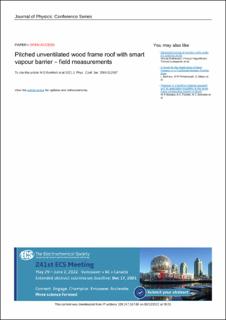| dc.contributor.author | Bunkholt, Nora Schjøth | |
| dc.contributor.author | Gullbrekken, Lars | |
| dc.contributor.author | Time, Berit | |
| dc.contributor.author | Kvande, Tore | |
| dc.date.accessioned | 2021-12-09T07:38:05Z | |
| dc.date.available | 2021-12-09T07:38:05Z | |
| dc.date.created | 2021-12-08T06:33:11Z | |
| dc.date.issued | 2021 | |
| dc.identifier.issn | 1742-6588 | |
| dc.identifier.uri | https://hdl.handle.net/11250/2833478 | |
| dc.description.abstract | Unventilated wood-frame roofs may provide smaller roof thickness and less material use compared to conventional unventilated roofs with all the thermal insulation above the load bearing structure. Unventilated roofs are, however, normally built without wooden materials between the vapour barrier and roof membrane due to moisture safety. Field measurements on the pitched unventilated wood-frame roof of an office building in Norway is performed to demonstrate and document the performance of this type of roof construction. Through monitoring of moisture and temperature, the study aims to contribute to verification of simulations and laboratory measurements showing that unventilated wood-frame roofs may be built with wooden materials if a smart vapour barrier is used. The results show moisture levels below 15 weight-% on the warm side of the rafters throughout the first 15 months of measurements. On the cold side of the rafters, the moisture content increased during winter due to built-in moisture in the construction and reached levels close to 25 weight-%. The moisture content decreased to around 15 weight-% when summer arrived, which shows an expected redistribution of moisture and indicates possible drying of the construction. The measurements underline the importance of limiting built-in moisture to reduce the risk of mould growth, but the study also implies that for some given premises an unventilated pitched wood-frame roof may have acceptable moisture risk. | |
| dc.language.iso | eng | |
| dc.rights | CC BY 3.0 | |
| dc.rights.uri | https://creativecommons.org/licenses/by/3.0/ | |
| dc.title | Pitched unventilated wood frame roof with smart vapour barrier – field measurements | |
| dc.type | Peer reviewed | |
| dc.type | Journal article | |
| dc.description.version | publishedVersion | |
| dc.rights.holder | © 2021 The Authors. | |
| dc.subject.nsi | VDP::Teknologi: 500 | |
| dc.source.volume | 2069 | |
| dc.source.journal | Journal of Physics: Conference Series (JPCS) | |
| dc.identifier.doi | 10.1088/1742-6596/2069/1/012007 | |
| dc.identifier.cristin | 1965874 | |
| dc.relation.project | Norges forskningsråd: 245663 | |
| dc.source.articlenumber | 012007 | |
| cristin.ispublished | true | |
| cristin.fulltext | original | |
| cristin.qualitycode | 1 | |

